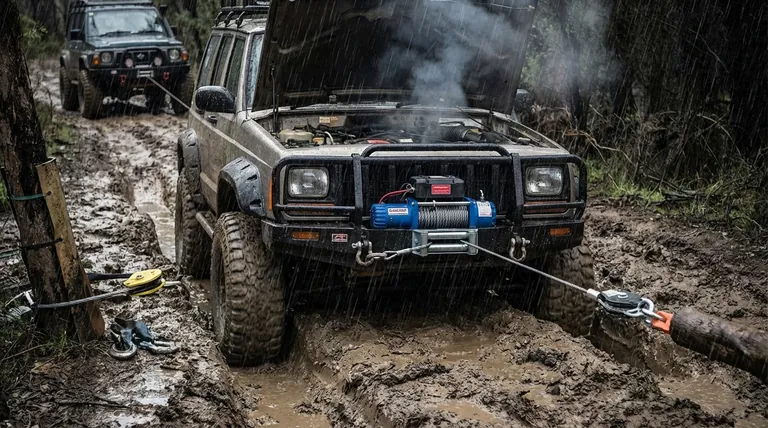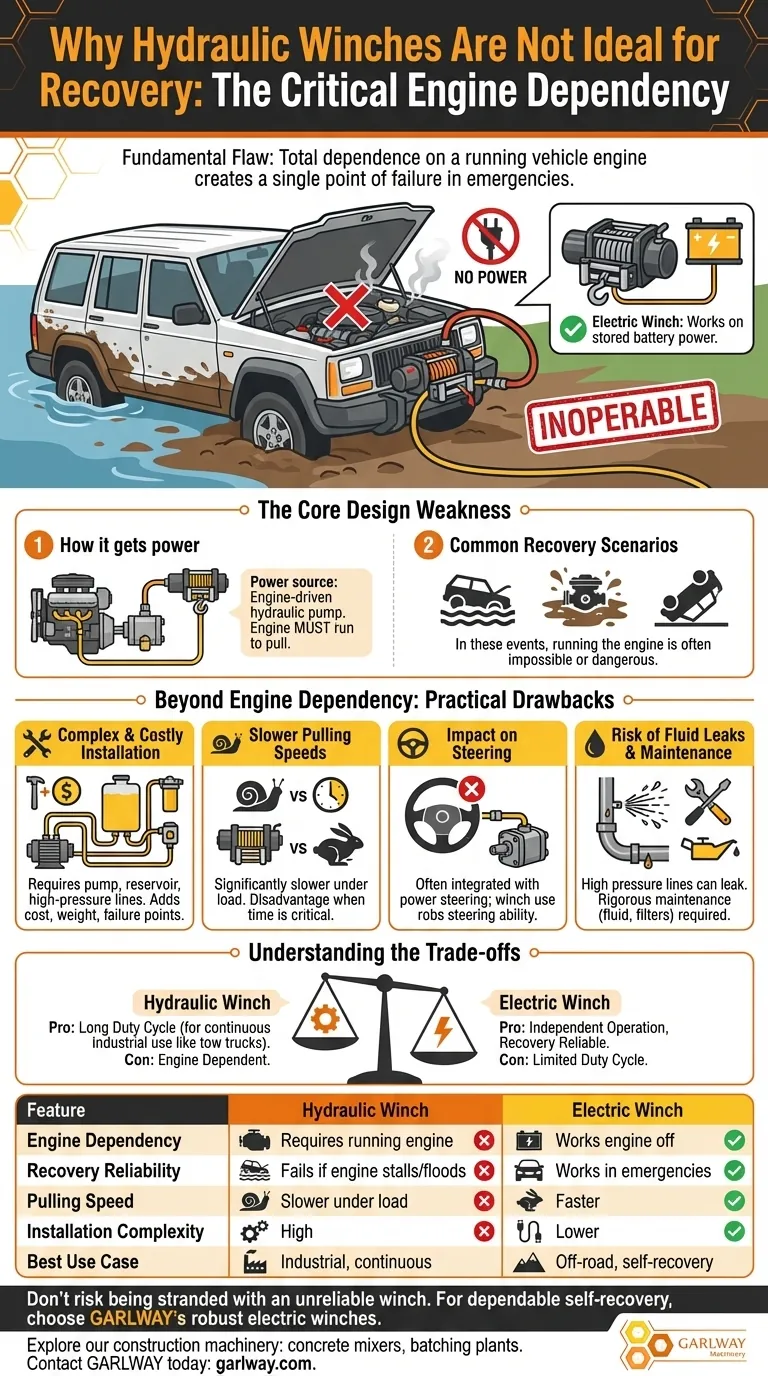The fundamental reason hydraulic winches are not ideal for recovery is their total dependence on a running vehicle engine. If your engine stalls, floods, or cannot run because the vehicle is on its side, a hydraulic winch becomes completely inoperable, failing you precisely when you need it most.
While known for their power and long duty cycles in industrial settings, the hydraulic winch's reliance on a functioning engine creates a critical point of failure in the unpredictable and often engine-compromising scenarios of off-road recovery.

The Critical Flaw: Engine Dependency
The core design of a hydraulic winch is also its greatest weakness in a recovery situation. Understanding this link is key to making an informed decision.
How a Hydraulic Winch Gets Power
A hydraulic winch doesn't connect to your battery. Instead, it's powered by a hydraulic pump, which is almost always driven by the vehicle's main engine, typically piggybacking on the power steering system.
This means for the winch to pull, the engine must be running to turn the pump and pressurize the hydraulic fluid.
The Most Common Recovery Scenarios
Consider the classic situations where you get stuck: stalling in deep water, flooding an engine in mud, or rolling a vehicle onto its side on a steep trail.
In all these cases, running the engine is either impossible or extremely unwise. An engine that has ingested water cannot be started, and running an engine on its side can cause catastrophic oil starvation.
The Consequence: A Helpless Vehicle
This creates the ultimate paradox. The very event that requires you to use a winch is often one that disables your engine, thereby disabling your hydraulic winch. An electric winch, in contrast, can operate directly off the battery's stored power, even with the engine off.
Beyond the Engine: Other Practical Drawbacks
Even if the engine is running perfectly, hydraulic systems introduce other complexities and performance limitations that make them less suitable for typical recreational recovery.
Complex and Costly Installation
Unlike an electric winch that primarily requires running heavy-gauge electrical cables to the battery, a hydraulic winch requires a much more involved setup.
This includes installing the hydraulic pump, a fluid reservoir, and a network of high-pressure lines and filters. This complexity adds significant cost, weight, and potential points of failure to your vehicle.
Slower Pulling Speeds
Hydraulic winches are known for being considerably slower under load than their electric counterparts. In a recovery situation where time or weather might be a factor, this can be a significant disadvantage.
Impact on Vehicle Steering
Because the winch's hydraulic pump is often integrated with the power steering system, operating the winch can rob most of the vehicle's steering ability. Trying to simultaneously pull and adjust the angle of your vehicle becomes extremely difficult.
Understanding the Trade-offs
To be objective, hydraulic winches have a purpose; it's just typically not for emergency recovery. Understanding their pros and cons clarifies their role.
The Risk of Fluid Leaks
Hydraulic systems operate under immense pressure. Any failure in a line or fitting can result in a high-pressure spray of hydraulic fluid, creating a mess, an environmental hazard, and disabling the winch.
Ongoing Maintenance Demands
The complexity of a hydraulic system demands more rigorous maintenance. You must regularly inspect for leaks and check the condition and level of the hydraulic fluid, in addition to servicing filters and the pump itself.
The Key Advantage: Duty Cycle
The one area where a hydraulic winch excels is its duty cycle. Because it dissipates heat through its fluid, it can pull continuously for very long periods without overheating. This is why they are common in industrial applications like tow trucks and commercial equipment, where the engine is always running and long, steady pulls are the norm.
Making the Right Choice for Your Goal
Your intended use case is the only factor that matters when choosing between hydraulic and electric systems.
- If your primary focus is emergency self-recovery: An electric winch is the superior choice due to its ability to operate independently of a running engine.
- If your primary focus is continuous industrial or commercial work: A hydraulic winch's unlimited duty cycle is a significant advantage, assuming the vehicle will always be operational during its use.
For the unpredictability of off-road recovery, prioritize the system that works even when everything else has gone wrong.
Summary Table:
| Feature | Hydraulic Winch | Electric Winch |
|---|---|---|
| Engine Dependency | Requires running engine | Operates with engine off |
| Recovery Reliability | Fails if engine stalls/floods | Works in most emergencies |
| Pulling Speed | Slower under load | Faster |
| Installation Complexity | High (pump, lines, reservoir) | Lower (cables to battery) |
| Best Use Case | Industrial, continuous pulls | Off-road, self-recovery |
Don't risk being stranded with an unreliable winch. For off-road enthusiasts and contractors who need dependable self-recovery equipment, GARLWAY offers robust electric winches designed to work when you need them most. Our winches provide the power and reliability critical for unpredictable situations, ensuring you can recover your vehicle even if the engine fails. Explore our full range of construction machinery, including concrete mixers and batching plants, built for durability and performance.
Contact GARLWAY today to find the right winch for your vehicle and ensure your next adventure or job site is safe and secure.
Visual Guide

Related Products
- Electric and Hydraulic Winch for Heavy Duty Applications
- Hydraulic Concrete Mixer Machine Cement Mixing Equipment for Mixture Concrete
- JDY350 Electric Hydraulic Mortar Mud Concrete Mixer
- Small Electric Winch 120V and 240V for Compact Applications
- Electric 120V Boat Winch by Badlands
People Also Ask
- What safety rules should be followed when using a winch? A Guide to Secure and Efficient Operations
- What are the main differences between mortar and cement? Choose the Right Material for Your Project
- What is a hydraulic winch? The Ultimate Guide to Continuous Heavy-Duty Pulling Power
- What are the core components of a marine hydraulic winch system? Unlock Reliable Power for Your Vessel
- How is the hydraulic system typically powered in hydraulic winches? Leverage Your Vehicle's Engine for Maximum Torque
- What is a hand chain block and how does it work? A Guide to Manual Lifting Power
- What are the primary uses of cement in construction? The Essential Binder for Concrete and Mortar
- How does the boat launch ramp condition affect winch selection? Ensure Safe Retrieval on Any Ramp



















